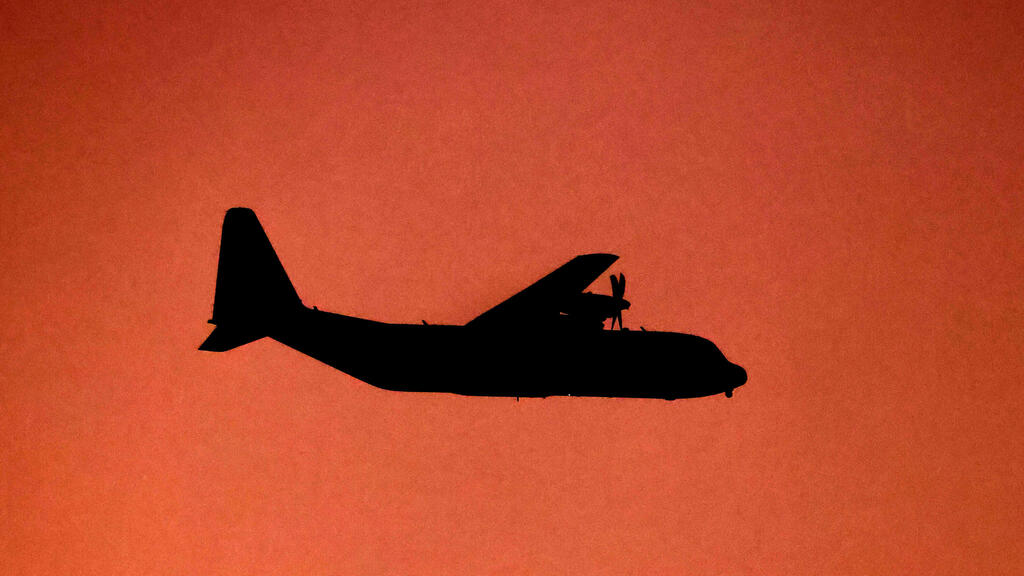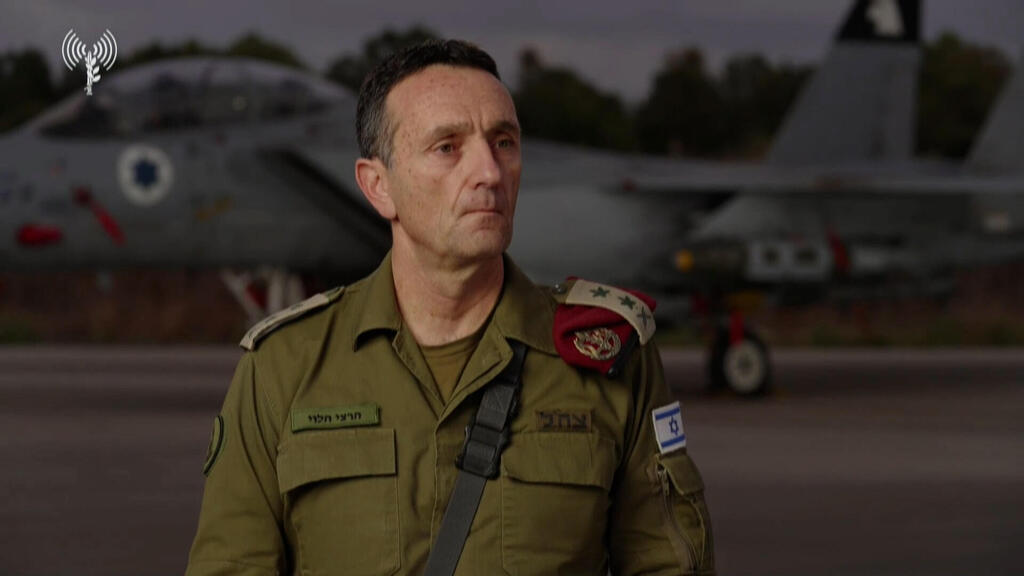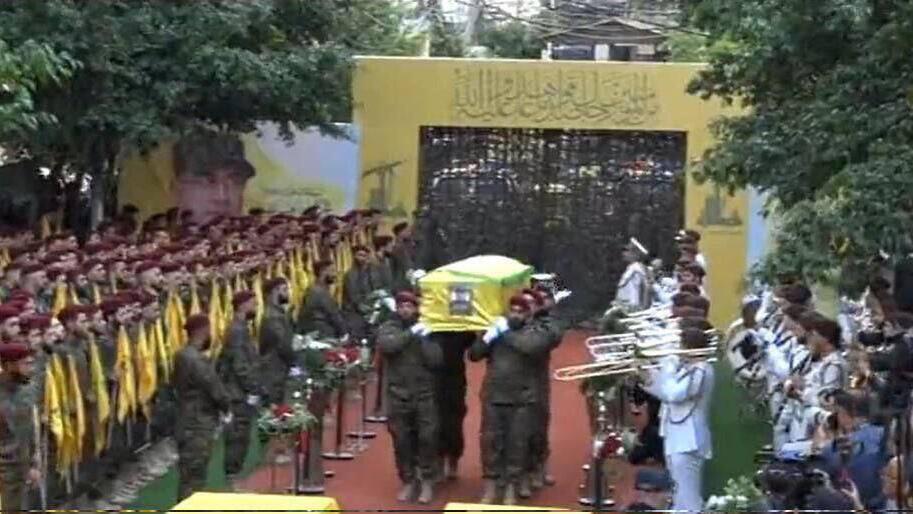Getting your Trinity Audio player ready...
Sirens sounded in the southern Golan Heights and along the border with Jordan in the Beit She'an Valley late on Sunday warning of hostile aircraft nearing the area. Middle East media outlets reported a warm of drones making its way from Iraq and Syria to attack Israel.
According to reports in Saudi Arabia, there were 15 drones launched presumably by Shiite militia groups. the IDF confirmed that one drone had crossed into Israel's airspace but could not confirm where it had come from. No injuries or damage were reported.
The Islamic Resistance Group, that includes all pro-Iran militias in Iraq claimed responsibility for the attack they said was aimed at a target in the northern Jordan Valley region.
Defense Minister Yoav Gallant said earlier on Sunday that the past week has been the hardest ever for Hezbollah. Gallant was on a visit to the northern command where he said that returning the residents of the north to their homes was a primary goal.
"The consecutive operations serve this purpose and we will continue to use all means at our disposal to achieve our objective as was decided by the government and as is deserving for our civilians."
7 View gallery


IDF chief of Northern Command Uri Gordin and Defense Minister Yoav Gallant
(Photo: Defense Ministry )
Chief of Staff Herzi Halevi said earlier that Hezbollah was planning an attack to kill Israeli civilians and abduct soldiers and that their intentions were disrupted by the attack on Beirut on Friday. "We beat them to it," he said speaking at an Air Force base in central Israel.
The assault on Hezbollah's chain of command is a clear message to the entire region. We are attacking and destroying all of the Radwan force's infrastructure, and are working ceaselessly to remove them from our border.
The military chief said that despite the focus appearing to be currently on the northern front, the return of the hostages from Hamas captivity is an objective of the war that must be achieved quickly because their time is running out.
Hezbollah deputy secretary-general Naim Qassem said that the group had entered a new phase of its battle with Israel which he described as an "open-ended battle of reckoning," in comments made on Sunday during a funeral for a top commander killed in an Israeli strike on Beirut's southern suburbs on Friday.
7 View gallery


Hezbollah second in command Naim Qassem at the funeral of senior members of the terror group in Beirut
"Israel committed three painful crimes in cruelty never before seen," Qassem said. "it wanted to kill 5,000 people in the pager massacre but failed. In its attack on the senior commanders of the Radwan force, it tried to incapacitate Hezbollah, turn others against the group and stop the support for the Palestinians bus Hezbollah operatives prevented that."
The Homefront Command said on Sunday that schools will remain closed in the north again on Monday, out of security concerns. The restrictions on schools extend to the northern part of the country from Haifa in the South to the border including the Jezreel Valley, Lower Galilee Upper and Western Galilee and the Golan Heights. communities around the Sea of Galilee will also conduct distance learning only.
Prime Minister Benjamin Netanyahu told the Knesset Foreign Affairs and Defense Committee on Sunday that according to Israel's intelligence, at least half of the 101 hostages held by Hamas in Gaza, are alive.
The IDF was asked to present to the government options for control of food and aid distribution to the residents of the Gaza Strip after Prime Minister Benjamin Netanyahu said he was mulling a plan presented by former senior IDF commanders, to prevent Hamas from controlling the aid and retaining its rule on the area.
More than half a million residents across northern Israel spent a tense night in bomb shelters overnight Sunday as Hezbollah rocket barrages targeted the Haifa Bay area and the Jezreel Valley, causing significant damage to property and leaving several injured.
Alarms were sounded in cities and towns including Nazareth, Nof Hagalil, Migdal HaEmek, Acre, Shfar’am, Yarka, Daliyat al-Karme and Isfiya, as well as in numerous kibbutzim and villages, most of which had been largely untouched by the war until now.
Early Sunday, around 6:30 a.m., the IDF reported 85 rockets were fired within a half hour, hitting communities from Kiryat Bialik to the Jezreel Valley, causing extensive damage and injuring several people. In total, over 115 rockets have been fired from Lebanon since midnight.
Moment Hezbollah rocket hit residential area in Kiryat Bialik
A rocket struck a two-story residential building and several cars in Kiryat Bialik in one of the attacks, causing extensive damage. Four people were injured from shrapnel in the attack—a man in his seventies who was moderately wounded and another three who sustained light injuries, including a 16-year-old girl. Several others suffered from shock.
“I was at home with my granddaughter when we heard the explosion. The blast was so powerful it ripped the metal window frame out,” said one Kiryat Bialik resident who was hospitalized along with his granddaughter. “The shrapnel flew into the room, injuring her, but if we hadn’t been in the safe room, we would have been killed. When I went outside, I saw the house was gone, and the cars too.”
Twelve additional people were treated at hospitals in Galilee Medical Center in Nahariya and Emek Medical Center in Afula for light injuries sustained while rushing to shelters or due to shock.
Aftermath of Hezbollah rocket attack on Kiryat Bialik
(Video: Gil Nechushtan)
Following an assessment, hospitals across the region, including Rambam Health Care Campus in Haifa, moved their operations to protected areas.
Hezbollah claimed it had targeted the Ramat David Air Base and a Rafael Advanced Defense Systems facility in Haifa Bay in what it described as an "initial response" to last week's attacks involving pagers and walkie-talkies.
Early Sunday, around 6:30 a.m., the IDF reported 85 rockets were fired within a half hour, hitting communities from Kiryat Bialik to the Jezreel Valley, causing extensive damage and injuring several people. In total, over 115 rockets have been fired from Lebanon since midnight.
7 View gallery


Jezreel Valley cowshed takes direct impact from Hezbollah rocket
(Photo: Israel Police)
A Hezbollah rocket struck a cowshed in the small farming community of Moshav Beit She'arim in northern Israel’s Jezreel Valley early Sunday, killing 15 cows and causing significant damage to agricultural infrastructure.
First published: 13:17, 09.22.24









